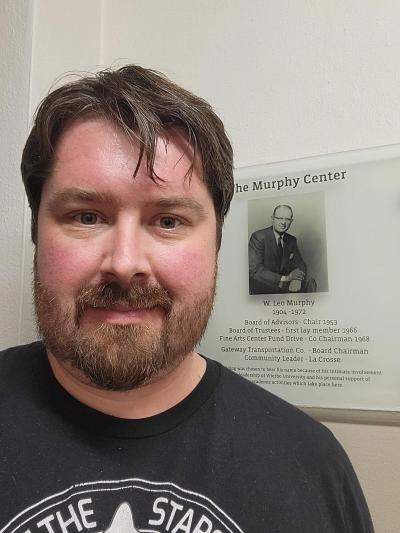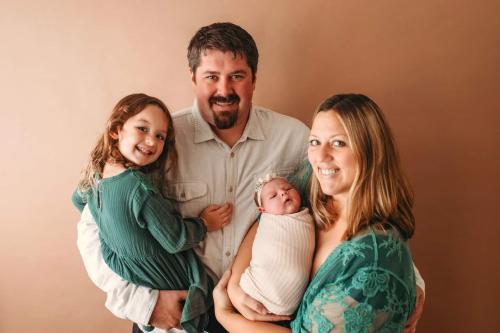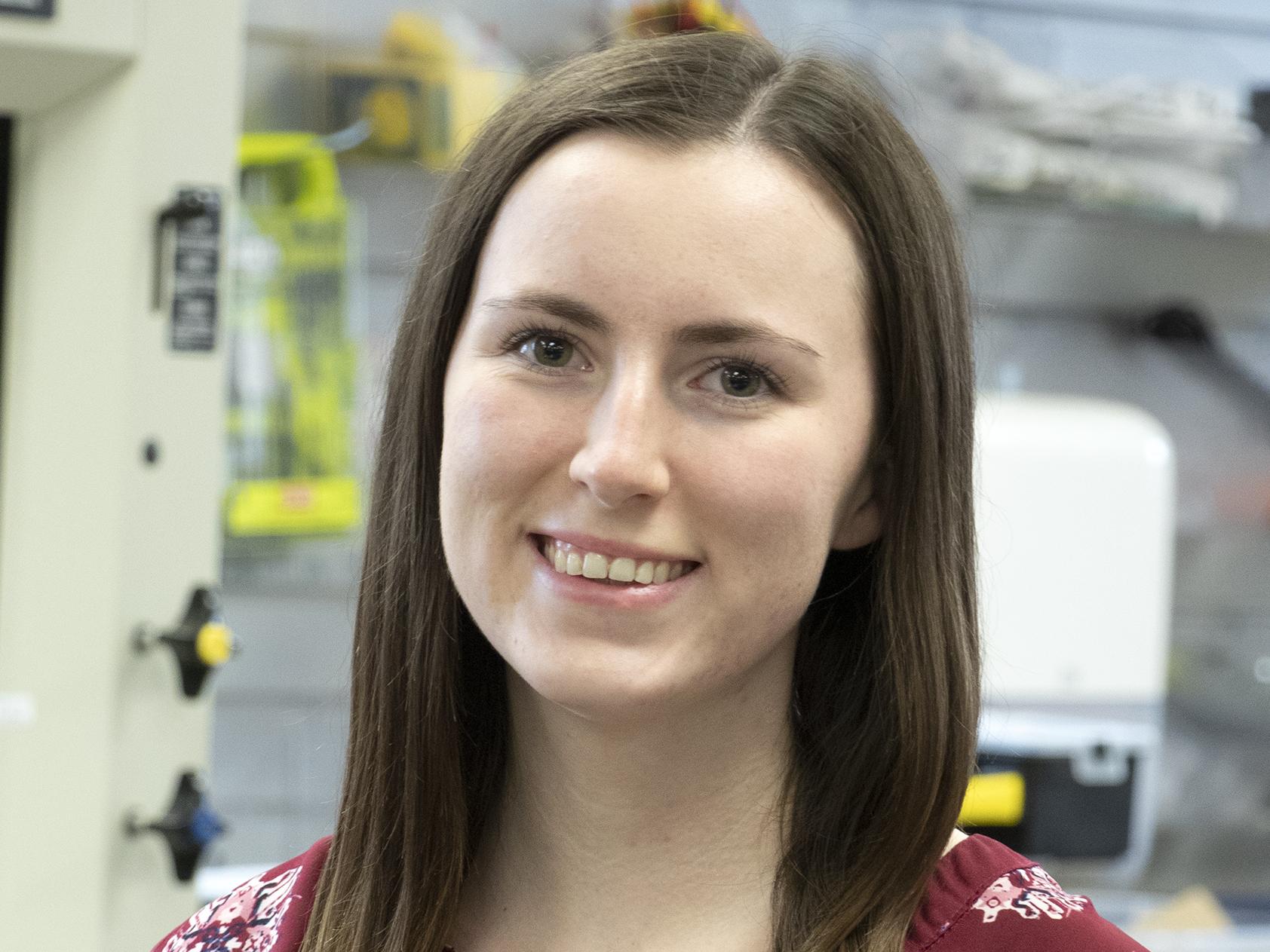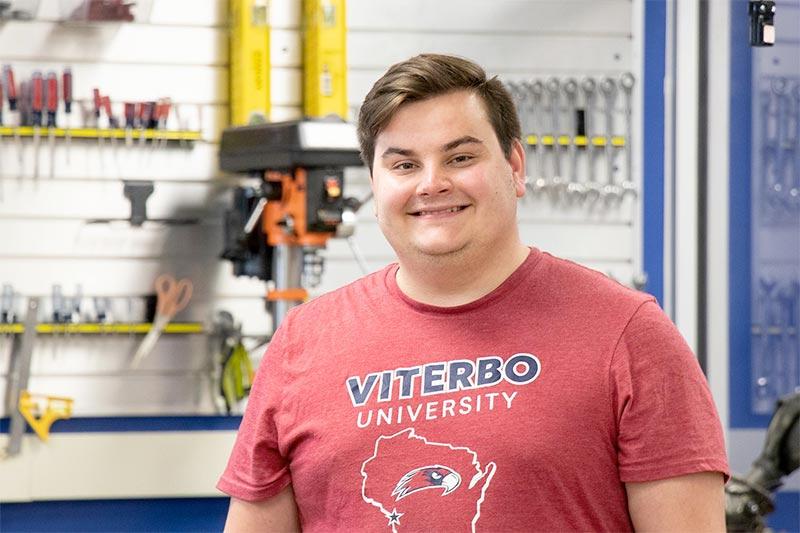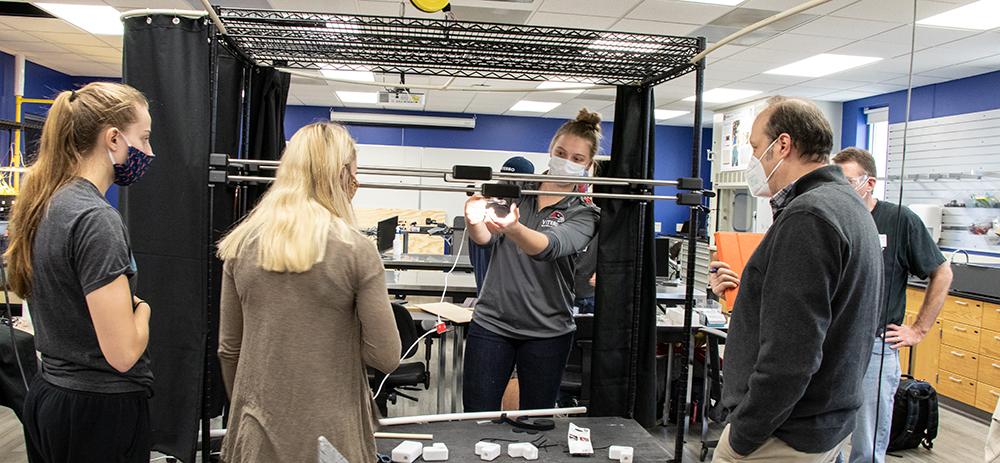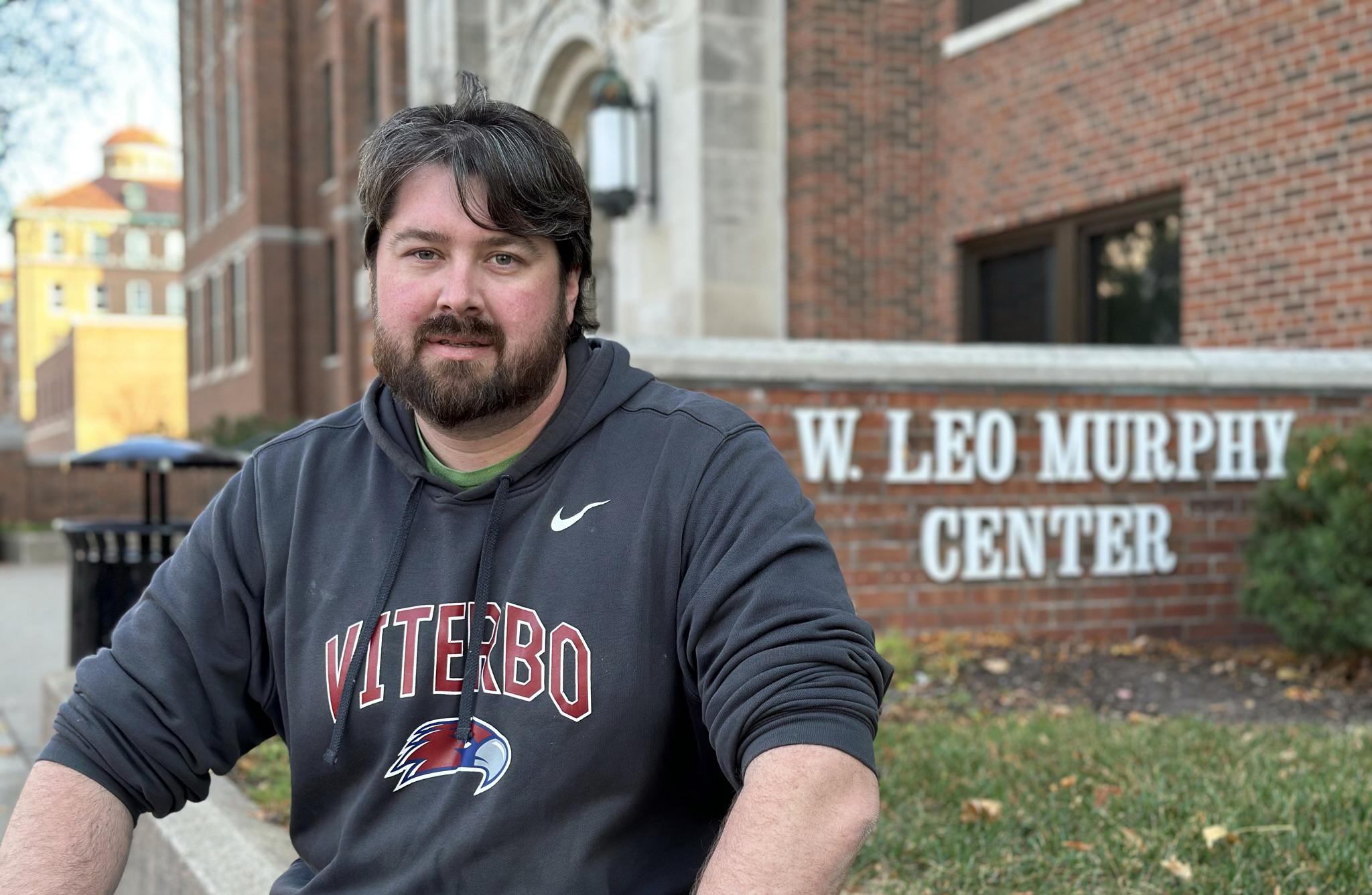
The first time senior engineering major Gordon Murphy went to pay his tuition, he had an experience few if any Viterbo students have had before: He stood face to face with a portrait of his grandfather.
There on the second floor of Murphy Center was a framed black-and-white photo of Murphy’s grandfather, W. Leo Murphy. The portrait was there for good reason, of course. The 81-year-old building was renamed in Leo Murphy’s honor in 1972, just weeks after his death at age 68.
Leo Murphy ran Gateway Transportation Company, one of the nation’s most successful trucking companies, and was a major supporter of Viterbo. He served as the first chair of a new Viterbo Board of Advisors formed in 1953. In 1966, he was named to Viterbo’s Board of Trustees along with Howard Dahl, which was the first time lay people were asked to serve as trustees. He went on to co-chair the fundraising effort to build Viterbo’s Fine Arts Center.
Gordon Murphy was born to Leo’s youngest son, Pierce Michael Murphy, and his wife, Cleo. Growing up, Murphy didn’t know a lot about his grandfather, who died before Gordon was born, but he learned more about him doing a research paper as part of his studies at Viterbo.
Murphy learned, for example, that his grandfather was the driving force behind Gateway, that he was huge supporter of the Boy Scouts of America (guess why this region of the BSA is called the Gateway Council), and that he was an intensely driven man.
“That guy, all he did was work,” Murphy said.
The same thing could be said of the grandson.
When he was a student at Central High School, Murphy worked three jobs, not necessarily by choice.
“I wasn’t a great high school student. I got by. Family life was rough. I was literally working to help pay the family’s rent then,” Murphy said. “If my life would have been all rainbows and sunshine, I would have gone to college to be an architect. That wasn’t in the cards at that time.”
Instead of going to college after high school, Murphy dove into the workforce. For two decades, he worked in the manufacturing sector, first at Torrance Casting, then Badger Corrugating, Chart Industries, and Trane. He worked in a variety of roles, including machinist and tool making, and tended to be given leadership roles wherever he went.
“I was not trying to be a leader. It just happened,” Murphy said. “I didn’t seek or want power necessarily. I just like getting stuff done.”
Murphy was starting to feel like he needed to make a change, to get on a new path, when he had a chance encounter. He and his wife, Rebekka, went out to dinner for their second wedding anniversary. Enjoying an after-dinner drink, they struck up a conversation with an older couple. The woman taught English at Viterbo, and after learning of Murphy’s background mentioned there was a new Viterbo engineering degree program and that he could start his studies at Western Technical College.
“The next day I went to Western and signed up for classes,” he said.
Murphy expects to complete work on his degree this year, graduating next May, and he gives a lot of credit to Viterbo’s small class sizes and the personal attention from engineering professors Emily Vanderfleet and Rick Harned for him getting through the program while working full time and caring for his family, which includes two daughters, 5-year-old Keeley and 1-year-old Leonora, and a mother moving into advanced stages of dementia. He also pitches in when Rebekka needs help with her business, Ladybug Photography.
The beginning of the last school year was especially difficult. Just before the school year was to begin, Murphy’s mother’s apartment became uninhabitable because of flooding and he had a lot of work getting her settled into a new place. A month after the flood, Leonora was born, and a month after that Rebekka was battling a rare near-fatal infection after being bitten by a stray kitty.
“Viterbo has been great. It’s been hard, but that’s my lifestyle, not school. Emily and Rick have been amazing. The small class sizes have been critical to not just me but to a lot of us. A lot of these concepts are very difficult,” Murphy said. “It’s been eye opening, helping me understand more about what I already know from my 20 years of work experience.”
Viterbo’s engineering program puts a lot of emphasis on preparing students to apply their technical knowledge in the workplace. Having Murphy in his class is valuable to other students, Harned said, because he has a lot of “real world” experiences, both in the technical realm and in effectively working in a company setting.
“Gordon brings a unique depth of technical, practical, workforce and business ownership experience to the classroom,” Harned said. “Gordon will be the one who challenges me to explain why subject matter content doesn’t always match with what he has experienced in the work force. And he has an in-depth working knowledge of state of the art practices with metal tooling and fabrication that are not found in books.
“He also provides insights to a company’s communication, organizational and operational tempo from the perspective of being on the receiving end of engineering decisions and practices,” Harned added.
While a lot of Viterbo engineering students have to figure out what area of engineering they want to go into, Murphy already knows he wants to focus on manufacturing engineering because of his work experience. “I don’t have to do any soul searching. I like manufacturing,” he said.
His future role as an engineer will involve familiar processes, Murphy said, but he’ll be less hands on and more involved in design, decision making, and problem solving. This semester he’s interning at Chart Industries, where he has worked full-time since 2012, except during a two-year layoff when he worked at Trane.
On top of his studies, work, and family life, this semester Murphy has something new to worry about, although it’s not necessarily bad. “I get job offers constantly,” he said. “Tesla has really been bugging me.”
Harned isn’t surprised Tesla and other companies would be eager to recruit Murphy.
“Gordon’s in-depth understanding of precision tooling and fabrication, its processes and best practices will make him attractive over other engineers without practical work experience,” Harned said. “Gordon will be the engineer who identifies the flaw in the plan, recognizes the risk areas, identifies the time, people, and resources needed to successfully work engineering problems, because this is already in his blood. He already possesses a technical depth and work experience that will complement his engineering education.”

